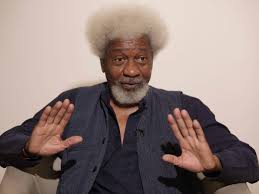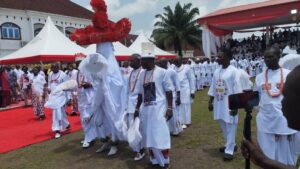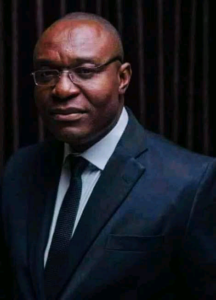“Legal Validity of Prof. Wole Soyinka’s Lagos Appointment”
At a recent public presentation of Kayode Fabunmi’s book on “The Story of a Giant” in Lagos, Mr Femi Falana, SAN examined the legal validity of the appointment of Prof. Wole Soyinka as the Co-Chairman of the Lagos State @ 50 Anniversary Committee; an appointment that has evoked protests and generated overwhelming negative reactions from the indigenes of Lagos State.
He sought to prove Eko Foundation wrong on the condemnation of the said appointment citing Constitutional provisions, the Federal Character Commission Act (FCC Act) and two decisions of the apex court in support of his arguments. Curiously, learned silk limited his defences to the controversial appointment of the Nobel Laureate which is merely a footnote in the legitimate struggle of the indigenes of Lagos State for the recognition and protection of their rights in the governance of their State. This response encompasses the wider issues of marginalisation, oppression and discrimination by the current administration in Lagos State.
While the cosmopolitan nature of Lagos and the capital city of the State is not in doubt, Lagos State (consisting of Ikeja, Badagry, Ikorodu, Lagos Island and Epe) is a creation of Law and one of the thirty six States named in section 3(1) of the Constitution of the Federal Republic of Nigeria, 1999 (“the Constitution”). States within the federal structure are ascribed equal constitutional status in terms of the apparatus of government, division into Local Government Areas, senatorial districts and constituencies, and are susceptible to the application of the federal character principles as enshrined in the Constitution and the FCC Act. Lagos State, like the other sister states within the federal structure, is governed by Laws and the provisions of the Constitution without regard to extraneous matters or evolutionary credentials or global status. Despite the cosmopolitan nature of the Federal Capital Territory (FCT), the FCC Act recognises and protects the rights of indigenes therein with regards to appointments.
For the avoidance of doubt, the provisions of the Constitution and the FCC Act apply mutatis mutandis to all the States within the federal structure including the Federal Capital Territory without modifications.
It is important to note from the onset that the various arguments canvassed by Eko Foundation neither violate the provision of section 41(1) of the Constitution which guarantees freedom of movement and the right to reside in any part of Nigeria, nor section 42(1) thereof which abhors discrimination on grounds of ethnicity, place of origin, sex, religion or political opinion. In Lagos state, indigenes and non indigenes have been known to live together, interact and interrelate in many aspects of social life. Non indigenes own properties, live and earn their means of livelihood in the State. All these notwithstanding, learned silk would agree with us that non indigenes resident in Lagos State still keep in touch and relate with their people back home on different matters of socio-cultural import, they locate their country homes in their various Local Government Areas and bury their corpses in their home towns and villages.
They demonstrate their loyalty and allegiance to their States of origin through regular meetings and social events on the soil of Lagos State without harassments or molestations from the indigenes and showcase their State identities in various ways including erection of edifices in the names of their Associations.
Now, to the legal issues:
Section 42(3) of the Constitution provides that nothing in subsection 1 of the section shall invalidate any law by reason only that the law imposes restrictions with respect to the appointment of any person to any office under the state,… or to an office in the service of a body corporate established directly by any law in force in Nigeria. Thus, apart from being an existing law by virtue of section 315 of the Constitution and consequently, an Act of the National Assembly, the FCC Act is an Act which imposes restrictions with respect to appointment of any person to any office as stipulated in that provision, and its provisions are not invalidated by the constitutional provision prohibiting discrimination of the sort envisaged under section 42(1) rather, it is a clear case of an exception to the rule. It is bad interpretation therefore, to reckon with the rule without reference to this important exception.
The various provisions of the Constitution on federal character including section 147 therein which constitute the base must be read with the superstructure, the FCC Act, which is the main legislation on the principles of federal character and application thereof. Learned silk opined that:
Although section 147 of the Constitution provides that every state in the federation shall be represented in the federal cabinet by any indigene there is no such requirement at the state level. In other words, it is not stated in the Constitution that members of the executive, judicial and legislative arm of a state government shall be constituted by indigenes alone.
The foregoing opinion is misleading as it jettisons a very important aspect of the “Guiding principles and formulae for the distribution of all cadres of posts” (‘guiding principles’) which forms part of the FCC Act in that regard. Part III paragraph 6 sub paragraph (1) (a) of the guiding principles unequivocally states that the federal character principles which apply to the Federal Service in relation to the State shall apply to the States services in relation to local governments, while sub paragraph (2) provides that the appointment to the various political public offices shall be done on the basis of the representation of the local government areas or senatorial districts of the States as appropriate using the relevant formula. Thus, while the States and the Federal Capital Territory constitute the federation, the local governments within the State or the senatorial districts therein constitute the federating unit which is the State, for relevant purposes including the application of the federal character principles. Contrary to the submission of learned silk, the requirement of section 147 which is explained in Part III paragraphs 3-5 of the guiding principles for appointments to the federal service in relation to the States, shall apply to the State service in relation to local governments pursuant to paragraph 6 sub paragraphs (1) (a) and (2) of the guiding principles. While State of origin is the basis for appointments at the federal level, indigeneship of a Local Government is the parameter for appointments at the State level with the provisos that no person shall lay claim to more than one State; to a state and the Federal Capital Territory at the same time; or to more than one Local Government in a State. If a person is from Ogun State for example, he cannot come from Lagos
State at the same time otherwise, an offence is committed under the provisions of the FCC Act. And if that person is from Ogun State, he can only lay claim to one of the Local Governments within Ogun State, and no length of residency in any of the Local Governments in Lagos State or level of contributions to Lagos State can automatically change his status de jure.
The argument that a person is considered to be an indigene once he or she comes within the purview of the definition of indigene under the FCC Act without more, is tenuous. Learned silk referred to the case of Mr Segun Aganga from Edo State and an indigene of one of the Local Government Areas of the State whose appointment into President Jonathan’s cabinet on the platform of Lagos State was opposed by the former Governor of Lagos State and said:
In challenging Mr Fashola’s position, I did state that Mr Aganga is a Lagosian since he was born and bred in Lagos and has been accepted as indigene by one of the Local Governments in the State. My position was anchored on the Federal Character Commission Act which has defined an indigene of a local government is (sic) a “person either of whose parents was or any of his grandparents was or is an indigene of the local government concerned or accepted as an indigene by the local government, provided that no person shall lay claim to more than one local government.
The pertinent question here is whether there was a proper investigation as to whether or not Aganga had committed himself at any time to his real state of origin or his local government area within Edo State especially as his parents hailed from Edo State. What constitutes evidence of acceptance as an indigene by the local government concerned? Was any such evidence produced? If produced, was it credible? Can such evidence be presumed? Mere acceptance of a person as an indigene by a local government is not enough since a person cannot lay claim to two states at the same time. Can Aganga for example, stand before the Oba of Benin or any local Chief in Edo State, his parents and the whole family of his to say he is from Lagos State and not from Edo State? Are we sure that Aganga’s allegiance is not owed to Edo State as opposed to Lagos State? Claims to the indigeneship of Lagos State by non indigenes are mere smoke screens meant to gain political advantage, secure appointments and win contracts. The end result is that the wealth of Lagos State is taken to their States of origin to contest elective positions and develop their true States. We submit that acceptance by the Local Government in Lagos State of any person as indigene is subject to the person not being an indigene of a Local Government in another State. Any other reasoning would violate the provisions of the FCC Act. Pieces of evidence abound in schools’ records, JAMB forms and records of the State bursary/scholarship Boards, of the true states of origin and local government areas of many non indigenes who claim to be indigenes of Lagos State by virtue of which they have secured elective positions, appointments into the State and Federal cabinets as well as the Federal and State Civil Services in this country. Who is fooling who? I hope we are not asking Eko Foundation to open a cankerworm for some self acclaimed indigenes of Lagos State to be charged for perjury.
We disagree with the sweeping generalisation of the learned silk when he said:
Since every citizen is entitled to residency rights, it is submitted that the authorities of local governments are under a legal obligation to accept as an indigene every person who decides to live in any community other than their place of origin. In other words Nigerians citizens(sic) who have chosen to reside outside their states or local governments of origin are entitled to be fully assimilated into the way of life of their place of residence (emphasis ours)
On this, we note first and foremost, that the well known case of Director-General State Security Service v. Olisa Agbakoba (1999) 3 NWLR (Pt595) 314 cited by the learned silk in support of his proposition is not in tandem with the reasoning behind the status of indigeneship as contained in the provisions of the FCC Act which provisions do not violate section 41(1) of the Constitution on the right to freedom of movement and residence, in any material particular. Neither the facts of the case cited nor the ratio decidendi therein has any bearing on the subject of indigeneship. Second, it is not correct to equate residency rights which every Nigerian has with indigeneship status which is subject to scrutiny under the FCC Act. Third, while it is possible to change one’s residence, it is not possible to change the State of origin. Fourth, while it is arguable that evidence of full assimilation into the way of life of a place of residence may help in determining the personal law of a praepositus in cases of intestate succession (See Olowu v. Olowu (1985) 3 NWLR (Pt. 13) 378), that cannot be the true test of indigeneship for purposes of appointments under the FCC Act. We submit that Residency and indigeneship are two different connecting factors.
Learned silk’s argument is tantamount to this: An Ibo businessman born and bred within Aguata Local Government Area in Anambra State by parents of Anambra State origin but who has been resident in Oye Local Government Area of Ekiti State for business purposes in the last two decades may suddenly become an indigene of Ekiti State, and Oye Local Government has an obligation to accept him as such. That, of course, cannot be correct in law and we know as a fact that no true indigene of Ekiti State would accept that anomalous thinking for two reasons. In the first place, the Ibo business man could be said to be laying claim to two States of origin in violation of the proviso to paragraph 1 sub(2) under Part II of the Guiding principles of the FCC Act. Also, Oye Local Government of Ekiti State cannot legally accept the Ibo man as an indigene of Ekiti State without him relinquishing his natural State of origin, if that is possible. The argument canvassed by the learned silk would make nonsense of the indigeneship factor and make virtually all non indegenes resident in a State automatic indigenes of the State of residence contrary to the intendment of the Act. Also, where the Chairman of the Local Government is a non indigene, it provides an avenue to open a flood gate for non deserving individuals to acquire indigeneship of the State of residence illegally. It would enable a Nigerian from a State in Nigeria to contest and win a seat in the State House of Assembly of another State and yet vie for the governorship position in his State of origin. That, of course, should be possible from the arguments canvassed by learned silk!
The case of Lafia Local Government Vs The Executive Governor, Nasarawa State (2012) 17 NWLR (Pt.1328) 94 cited in support of learned silk’s argument on discrimination does not contradict the indigeneship factor in making appointments in the civil or public service of a State. rd thThe 3 -36 Respondents in that case were of Nasarawa State origin by virtue of being an indigene of one of the Local Government Areas of the State. Asking them to move from one Local Government Area to another would serve no meaningful purpose under the FCC Act, it would not justify application of the Act pursuant to section 42(3) of the Constitution and consequently, the policy of the State government in that case was in breach of sections 41(1) and 42(1) thereof. The decision of the Supreme Court in that case is definitely the law, but it does not apply to the arguments canvassed by Eko Foundation.
While the various provisions contained in the sections under the Fundamental Objectives and Directive Principles of State Policy (Chapter II of the Constitution) including sections 14 and 15 are non justiciable, we are not oblivious of plethora of judicial authorities interpreting the Fundamental Rights provisions (Chapter IV) in the spirit of the Fundamental objectives. However, we do not see how the arguments canvassed by Eko Foundation contravene those sections and precisely, section 14(4) of the Constitution. Section 14(4) provides:
The composition of the Government of a State, a local government Council, or any of the agencies of such Government or Council, and the conduct of affairs of the Government or Council or such agencies shall be carried out in such manner as to recognise the diversity of the people within its area of authority and the need to promote a sense of belonging and loyalty among all the people of the federation .
Recognising the diversity of people within the area of authority of the State or Local Government Council or any of its agencies is in tune with the Guidelines of the FCC Act. In Lagos State like in other sister States for example, we have diversity of people (e.g the Aworis, from the Lagos and Ikeja divisions, the ijebu speaking people from Ikorodu and Epe and the Eguns from Badagry) whose legitimate interests must be taken cognisance of in the composition and conduct of affairs of the Government of the State, Local Government Councils and any of its agencies. That informs the rotation of the Governorship seat and apportionment of appointments based on the recognised diversity within every State in the federation. Where does this accommodate non indigenes? Talking about the need to promote a sense of belonging and loyalty among all the people of the federation, we do not see how this mandates appointment of non indigenes to positions in the State Cabinet, State Civil Service etc. By allowing residence of non indigenes anywhere in the State, allowing them to do legitimate businesses within the State, encouraging inter marriage between indigenes and non indigenes and giving non indigenes the opportunity to own immovable property in the State etc., the State is promoting a sense of belonging and loyalty among all the people of the State. We do not see how promoting a sense of belonging and loyalty among all the people of the federation implies asking non indigenes to take over governance and 90% of appointments in the State.
Beyond legal issues involved:
It is pertinent to note that while learned silk may find nothing wrong in a non Ekiti person being appointed into the Ekiti State Executive Council, Judiciary or the State civil service or public service, his brothers and sisters who are indigenes of Ekiti will neither accept nor consider it; and this is not peculiar to Ekiti State. We were all witnesses to what happened to Abia State Indigenes in Imo State Public Service when Abia State was created. The same experience was witnessed when Osun State was created from Oyo State and Ekiti State from Ondo State. Can learned silk indicate one Osun State indigene living in Oyo State that has been appointed into the cabinet of Oyo State or any Indigene of Ondo State in the cabinet of Ekiti State?
It is a known undisputed fact that indigenes of other States in Nigeria do not accommodate other Nigerians in the polity and administration of their State. In fact, it is their practice to vigorously reject non indigenes in the affairs of their states. Some States even advertise for jobs in their public service with the categorical statement, “non indigenes need not apply”. We can furnish particulars.
Nigerians obviously know the truth, but if accepting the truth of a matter will hurt or deprive us of selfish advantage, we search for exceptions to the truth. Hence, the excuse of Lagos State being a cosmopolitan State and consequently, indigenes should be oppressed, marginalised and rendered second fiddle in their State. Is Lagos the only cosmopolitan State in Nigeria? We believe what is sauce for the goose should be sauce for the gander. We also add that Lagos possesses the international clout already and needs no one to either endow it, or give credence to the fact.
We recognise the notorious fact that Prof. Wole Soyinka is a national and an international figure, we welcome non indigenes and foreigners in our midst and applaud their contributions, what we are saying, for the umpteenth time, is the need for Governor Ambode’s administration in Lagos State to recognise and protect the legitimate interests of indigenes in their State. When Ogun State celebrated 40 anniversary of its creation, the Governor of that State did not pick a non indigene to Chair the planning committee. Eminent indigenes of Lagos State (some of whom are alive today) were instrumental to the creation of Lagos State AND NOT THE NOBEL LAUREATE.
EKO FOUNDATION OFFICERS: President: Prof. Imran Oluwole Smith, SAN, 1st Vice President: Chief (Mrs.) Teju Phillips, 2nd Vice President: Arc. ‘Biodun Dabiri General Secretary: ‘Kunle Uthman, Publicity Secretary: Mrs. R. Serano Osho, Organizing Secretary: Prof. H. Bombata, Social Secretary: Tokunbo Akinsemoyin, Ex-Officio: Hon. Justice ‘Niyi Adebajo (Rtd.)
Credit:Sahel Standard




